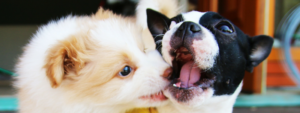When Should You Start Training A Puppy?
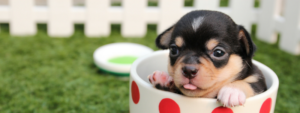
Just like a human child, a puppy’s’ brain is growing, nervous system branching out to form new and wondrous connections! The earliest weeks during a dog’s development are crucial; enjoyable experiences and great interactions can form a solid base for a top-notch adult, but negative interactions can leave a lasting effect, scaring the dog for the rest of its’ life.
The way you raise your puppy will lay the foundation for years to come! A solid, well-formatted upbringing can lead to a perfectly behaved, socially artistic, happily playful pet. On the flip side, negative interactions during this early stage can cause irreparable harm.
A puppy is born with their eyes closed; they don’t open until the pup is about 3 weeks old!
A Puppies’ Mental Development
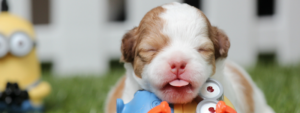
Week 1-7: During the first seven weeks, your adorable little ball of fur is building social interactions with mother and siblings, teaching him things like bite inhibition (when it is not appropriate to bite), submissive and attention seeking social behavior, etc.
Basically, your pup is learning to be a dog among dogs.
Week 7-8: This is an ideal time to take your puppy home! Your puppy is both mentally mature enough to begin an association with people and ready to be separated from mother and siblings. If possible, it’s not recommended to separate the puppy from its’ mother before seven weeks.
- Puppies are born unable to see or hear. At one time, it could be seen as an evolutionary advantage for a mother to have her puppies early; it would have been much easier for her to hund unhindered by a giant belly!
Week 8-16: This is a fantastic time to start socializing your puppy with other animals! Your pup will soak up social interaction like a sponge; try to make sure they are happy interactions. Bad or frightening experiences can have a lasting effect now; poor experiences could cause your dog to grow up timid or overly anxious.
- Never physically harm, yell at or otherwise frighten a puppy. Because their nervous system is still developing, enjoyable interactions are more crucial now than they ever will be.
This is an ideal point to start training! But remember, your puppies’ nervous system is still developing; patience is important! Believe me, it is more than possible to go through things like potty training just as effectively without raising your voice or losing your temper.
3-6 Months: A lot will happen during this time, but proper introductions are especially important now. Your pup will begin to determine their place in the order of things; their hierarchical order in ‘the pack’. In other words, you want your little one to familiarize themselves with children in the family (if you have any, and if this hasn’t happened already).
Behavioral issues, like misplaced dominance, do sometimes occur. Do your best to avoid these issues, and your pup will grow to a happy adult!
- Socialization often becomes exponentially more complicated and can be very time consuming in adults; it’s vastly easier to go through the process as a puppy!
Socializing Your Puppy
Socialization is perhaps one of the most important training facets your puppy will ever experience!
But why, you ask? Were you thinking of something else?
If you never plan on introducing your dog to anyone but you (no kids or other animals, ever), that is one thing. Of course, it could be a bit cruel, considering dogs are pack animals and nature intended them to be socially interactive.
On the other hand, if you do plan on taking your dog on wondrous trips to the park, having your relatives’ kids over, or really anything that involves other animals- early socialization is mandatory! Consider taking your puppy to obedience classes around other puppies, or letting it play with the kids (supervised). You might consider asking strangers you pass to hand your pup a treat, teaching him strangers shouldn’t be feared.
Many old school trainers don’t believe their dogs should be desensitized to strangers or other people’s children. Consider this: it is most often the animals that have never interacted with children or other animals that react defensively; this is only a natural response to something confusing that could harm them.
Children love animals; kids often don’t understand when it’s appropriate to leave a dog be. They might even try to hug a dog, not understanding that this means something completely different to dogs not accustomed to being hugged, or children– signifying dominance as opposed to affection (the case with humans).
Think of it from your dog’s perspective; a smaller creature you have never encountered before enters your territory and attempts to insert its’ dominance over you. What do you do?
- In other words, if you never ‘desensitize’ your dog to other people’s children, don’t be surprised if he bites that child that reaches through the fence to pet him or won’t let him be.
Why should you start socialization during puppy-hood, as opposed to waiting? Well, puppies begin to develop their personalities at this time; experiences now will shape their development. This is the time when they are most susceptible to social interaction!
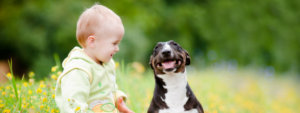
- According to ‘Web MD’, it can take 4-6 months to fully potty train a puppy, and then it depends upon proper training techniques.
There are a few basic principles all dog trainers use; it isn’t a ‘big secret’. They can be summed up under categories:
Conditioning: Just like humans, dogs make associations. To get them to form the association you want, be Persistent; continue to Reinforce the associations you want your puppy to make by doing the same thing every time.
Unlike humans, we can ‘vocally’ talk to our dogs; if you change up your methods or begin to skip steps, it could confuse your puppy. It is very important to stay Consistent with any form of dog training (not merely puppy training).
In conclusion, congratulations on your new puppy! We all wish you fantastic experiences to come!
Why Proper Socialization for a Puppy is so Crucial
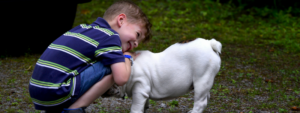
A puppy’s training can lay a foundation for the rest of their lives! The quality of their future personality and overall demeanor will often reflect effort spent with them at a young age. The principle is similar to that of humans; raise a child in a negative environment, and it could have drastic effects on their future.
Countless cases exist where puppies were brought up by ‘abusive’ (either verbally or physically) owners; these dogs all too often grow up to either be overly timid or overly aggressive. Because the damage was done during such a crucial time period, while their nervous system was still developing, it can sometimes be all but impossible to rectify even for the most experienced of behaviorists.
This is why proper socialization is probably the absolute most important aspect of puppy training any owner could go through, which should begin during puppyhood. While attempting to socialize problematic adults is usually very possible, it can be leagues more complicated than socializing a puppy.
On top of that, we needn’t worry about puppy confrontations, if that were to actually arise. On the other hand, separating any fully grown large breeds (or even medium breeds) can result in injury to the human handler.
Importance of Correct Puppy Training
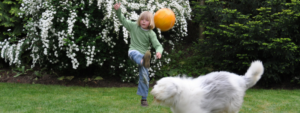
It’s pretty important to teach a behavior correctly the first time, and not to encourage incorrect behaviors. You might think this seems common sense, but poor behaviors are encouraged more than people think.
Consider this- a puppy ‘escapes’ his enclosure, and ignores attempts at recall; the pup is having too much fun exploring this new environment! You might think this is no big deal because it is just a puppy, and can’t run fast enough to get itself into trouble.
Every time that puppy ‘escapes’ and ignores attempts at recall, the fact that it doesn’t need to return, everything will be ‘OK’, is enforced. Soon, this deference becomes a ‘Learned Behavior’, and proper training is much more complicated- often even if done correctly.
The irony is- time and time again, owners are seen screaming at their dogs to return, and proceeding to scold them once they do return. A human adult would understand why he/she is being scolded, what he did wrong, but a dog?
What does this teach our dogs, on the other hand? The learning outcome is two-fold; one- they may return whenever they wish, and two- they will be punished upon returning.
A Possible Example!
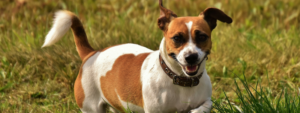
‘Robert’ cares for a young Jack Russell Terrier named Loki, a breed conceived to chase small game. Already genetically predisposed to want to chase small animals, Loki bolts out the door every single time he gets a chance, ignoring Robs’ frantic calls. Because Rob chases loki every time he runs off, repeating the same calling behavior (ignored every time), the dog soon learns he has more to gain by running off.
This unwanted behavior soon becomes an established ‘learned behavior’; Loki has learned he has nothing to lose by running, actually enjoys the ‘chase’.
Proper Conditioning For Your Pup
In order to condition a behavior correctly, it is important to repeat the exact training process in a desirable fashion. If rewards are given, give some type of reward every time; this is the dog’s incentive to perform. Altering techniques can serve to confuse the dog.
Repetition, repetition, repetition!

